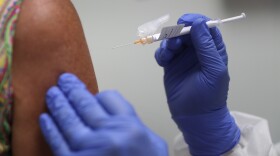Ohio State University is now offering cancer and organ transplant patients a third dose of the Pfizer or Moderna vaccine to prevent COVID-19 infections. Dr. Raphael Pollock, director of the OSU Comprehensive Cancer Center, and also a cancer patient will be among the first to receive the third dose.
In 2017, Pollock was diagnosed with chronic lymphocytic leukemia. He said that makes him immunocompromised and more vulnerable to getting COVID-19.
“In my case approximately half of the chronic leukemia patients if infected will develop a severe life-threatening infection,” Pollock said. “So, the potential long-term downsides of getting a third dose of vaccination are not anywhere near comparable to the risk of getting a COVID infection in the first place.”
The U.S. Food and Drug Administration on August 13 issued an emergency authorization of a third COVID-19 vaccine dose for people at greater risk for infection due to health conditions that reduce immune system function.
Pollock’s cancer interferes with the response of antibodies to infections.
“As a result of that reality COVID infections in chronic leukemia and other blood cancer patients can have much more devastating consequences,” he said.
Pollock expects everyone will need a third dose of the vaccine to fight COVID-19.
"All indications suggest that it has a life span perhaps as short as six months to perhaps nine to 12 months in duration,” he said. “That being the case, the need for boosters becomes very apparent."
OSU is now accepting appointments for a third vaccine dose from those who have received either the Moderna of Pfizer vaccines and have also undergone an organ transplant or who are equally immunocompromised.
Copyright 2021 WOSU 89.7 NPR News. To see more, visit WOSU 89.7 NPR News.







